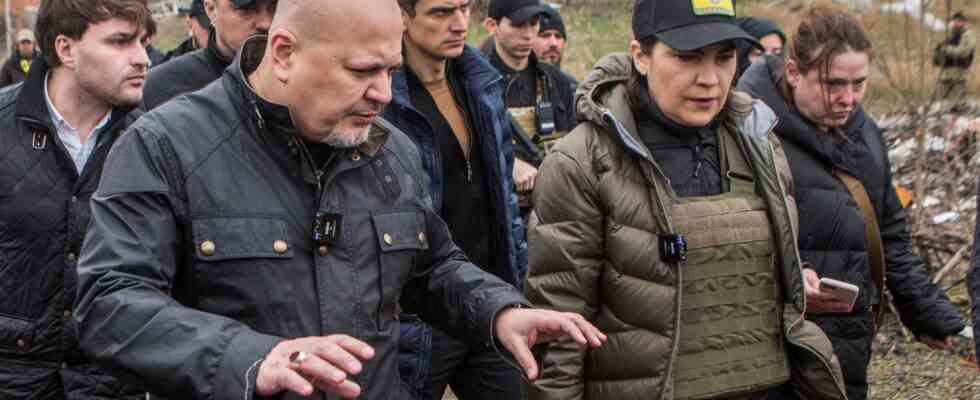interview
As of: 07/16/2022 4:27 p.m
Many institutions and NGOs are investigating war crimes in Ukraine. The chief prosecutor of the International Criminal Court, Khan, warns in ARD-Interview before uncoordinated investigations: These could also do harm.
ARD: The world is shocked by the atrocities in Ukraine. Is there any realistic chance that the perpetrators will ever face an international court?
Karim Khan: We need to collect the evidence. Only when we have the evidence is there hope for justice. We have seen it in other parts of the world: be it Slobodan Milosevic or Radovan Karadzic or Ratko Mladic in the former Yugoslavia or be it the former President of Liberia Charles Taylor – these are people who thought they were above the law or getting away with it . They often experienced a rude awakening.
To person
British lawyer Karim Khan has been chief prosecutor at the International Criminal Court (ICC) in The Hague since 2021. The 52-year-old previously held various positions in international war crimes investigations.
“Danger of a stampede”
ARD: There are so many individuals and organizations trying to collect evidence. Is it good?
Khan: no I see the danger that there will be a rush. That we tread down with our own feet the grass we want to protect. That’s a big risk. We see obvious over-documentation, particularly on the rape allegations. People are questioned far too often. That is why coordination is so important.
ARD: Where exactly is the problem?
Khan: Witnesses and victims must not become a commodity. In this onslaught, we must collect evidence in a way that focuses on the victims and doesn’t re-traumatize them. That requires discipline. For this reason, let’s not document too much and try to realize that documenting war crimes isn’t the only “show in town”. [Anmerkung der Redaktion: Die einzige Art, sich zu engagieren/profilieren] is for NGOs.
“Difference Between Trained and Untrained Interviewers”
ARD: I understand the psychological risks of too frequent questioning…
Khan: The environment in which a person is interviewed is important. When someone is pulled off a bus just coming from a conflict zone, you can imagine the trauma and uncertainty. And that he or she might not be able to make a coherent statement.
There is a difference between trained and untrained interviewers. Especially when it comes to children or sexual or gender-based crimes. It’s important to have professionals who are methodical. It’s also about witness protection.
“Then there are inconsistencies”
ARD: Are there any legal risks as a result? Those that might even prevent perpetrators from being punished?
Khan: If we approach it as if it’s just about the person’s story, what will happen? Then there are inconsistencies. We find again and again that it is not necessarily the fault of the witness. But the circumstances under which the surveys were carried out. And also the way the document was created.
Witness statements can be meaningful. But they must be narrowed down. And also supported by evidence that is not testimony. This creates strong cases for the independent judges of the ICC to judge in due course.
ARD: Which evidence gatherers do you think are too many – and should withdraw?
Khan: We have created a guide aimed at NGOs. In it we say quite clearly: if in doubt, do not document it, but hand it over to the experts, the public prosecutor’s office, refer to national law enforcement agencies. Don’t think that you can just question people like that. It’s very traumatic when you’ve been raped. When you’ve lost a loved one. If you have experienced rocket attacks in subway shafts.
You can imagine that remembering it when today and tomorrow are so uncertain can be destabilizing and traumatic. So we really need to understand why we’re asking. Victims and witnesses must not simply be considered [juristische] serve ammunition. Your welfare must be the focus of the investigation.
“Need a system for sharing information”
ARD: The EU is trying to help secure evidence. Is that necessary?
Khan: I think that’s important. I joined a joint investigative team that initially consisted of three states and now consists of six. There are also structural, central investigations in Germany and France, in Sweden and some other countries. We need a system in which we try to exchange information. But just: not to document too much.
It must not become a Wild West in which people do different things and in which the interests of victims and witnesses only play a secondary role. This is the only way to increase the likelihood that evidence will be obtained in the best possible way. Such that judges can then evaluate independently in fair proceedings in due course.
ARD: If there really are international war crimes trials in Ukraine one day, will they take place at the International Criminal Court (ICC) in The Hague? Or will it be a special court like the Yugoslavia tribunal?
Khan: There is a lot of support for the ICC. We have 123 States Parties. A third of them referred the Ukraine matter to us. 43 states. And why? The Yugoslavia Tribunal was created by the United Nations Security Council in those wonderful golden days when Security Council resolutions were still possible. This is not the world we live in right now.
So I don’t think there will be a tribunal created by the Security Council. But we have a permanent court. We should use it – and not let ourselves be distracted by imaginative or theoretical possibilities. I’m much more practical. We have a court, we have judges. We have a building. We have the law, we have the experience. And now we need the means to meet our responsibilities.
The interview was conducted by Markus Preiß, ARD studio in Brussels

